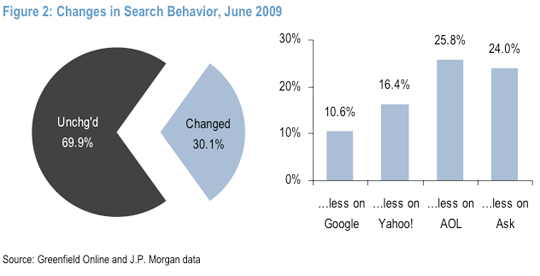Report: Google Has Nothing To Fear From Bing Itself
The only thing Google has to fear is fear itself. The immortal words of Franklin Delano Roosevelt sum up the findings of a J.P. Morgan report published today and shared with Search Engine Land, “Understanding the Impact of Bing on the Search Industry.” (It’s available to the company’s clients at mm.jpmorgan.com.) The bottom line: Of […]
The only thing Google has to fear is fear itself. The immortal words of Franklin Delano Roosevelt sum up the findings of a J.P. Morgan report published today and shared with Search Engine Land, “Understanding the Impact of Bing on the Search Industry.” (It’s available to the company’s clients at mm.jpmorgan.com.) The bottom line: Of 763 people (ages 18 and up) surveyed, roughly 98% will not be making Bing their primary search engine.
Microsoft budgeted $80 million to promote Bing — some of which seemed to be money well-spent, and some not so well-spent. The J.P. Morgan study shows that Microsoft’s publicity blitz worked to some degree: 59% of respondents had heard of Bing. But out of that group, only 42% had tried it — that represents only 25% of the overall survey respondents. It suggests that Microsoft’s ad campaign reached people, but didn’t convince many to give Bing a try. In fact, it seems there was a lot of “tasting” going on: Of the people who tried Bing, 61% used it five times or less during June.
Further, the study showed that searchers who gave Bing a try during weren’t switching from Google (nor from Yahoo, to a lesser degree) — they mainly came from AOL and Ask.
According to the report, Microsoft’s biggest barrier is that most searchers are happy these days. Some 63% of respondents said they see no weaknesses in their current search experience. J.P. Morgan estimates that Bing will only see a 2.3% growth in overall market share going forward. It’s not unlike the recent findings from a small focus group in New York that suggested searchers liked Bing, but those using Google wouldn’t switch. Google CEO Eric Schmidt may have been right when he went on TV and said Bing can’t buy search share, they’ll have to earn it.
The study was done between July 3rd and July 6th — about a month after Bing launched. The 763 people who replied were remarkably representative of the Internet population as a whole: 62% said Google was their primary search engine, 23% said it was Yahoo, and 7% said it was Bing. Those figures are right in line with the regular statistics published by companies like Hitwise, comScore, and Nielsen.
Ultimately, while the study offers a strong peak into searcher behavior, it’s important to remember that Bing is only a month old and habits are hard to break. As Danny Sullivan wrote yesterday, we’re still in “too early to say” territory, and any conclusions about Bing’s future are probably premature.
Opinions expressed in this article are those of the guest author and not necessarily Search Engine Land. Staff authors are listed here.
Related stories
New on Search Engine Land

